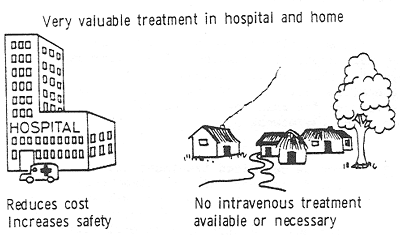Slide 20 (Also Figure 8)
Oral rehydration in hospital
(Review Slide 7)
We have talked about giving oral fluids at home, and in health centers. In the village, in this drawing, you
could never have the equipment for intravenous
rehydration. But if the people who live there know
about oral fluids, and if they use them, then they will seldom need intravenous fluids. We know from studies
in Bangladesh that when people use oral fluids to beat
diarrhoea, fewer children go to hospital, and fewer
children die. (Reference
5)
Figure 8 - Oral Rehydration - Very valuable treatment in hospital and home

Q. What about hospitals, where you can more easily
have intravenous rehydration? Is oral rehydration
useful there?
Teacher's Note
This is another discussion topic. Many people
who accept the idea of oral fluids at home, resist the idea of using them in hospital. They
may accept the idea more easily if they have a chance to express their doubts. |
A. Yes, oral rehydration is very useful in hospital also.
First, it is safer than intravenous rehydration.
Remember the complications of "drips" that="diarrhoea-management-07.htm" target="_blank"> Slide 7
showed. Second, oral rehydration is cheaper, and it
saves money which you need for other things.
Of course, a few severely dehydrated children
cannot be rehydrated orally, and for them,
intravenous fluids are life-saving. But many drips
are not necessary. Also, many children get worse
on the way to the hospital. By the time they arrive,
it is too late for oral therapy and they really do need
a 'drip'. But if they have oral fluids while they are
on the way to hospital, they may not need a drip at
all. Of course, if you give fluids early, many
children never need even to go to hospital. So that
saves everyone trouble, time, money and anxiety.
Health workers should not think because we say that
oral fluids are 'simple', that they are 'easy'. Oral rehydration needs only simple equipment. To teach it
requires skill, knowledge and concern. And you have
to be patient and determined to make it work.
And oral rehydration takes time. There ate not enough
nurses in most hospital wards to give every child a
spoonful of fluid every minute or two. So you must
admit a child's mother to the hospital or the rehydration
unit with him, so that she can give the fluid. The nurses
must teach and supervise the mothers. But that should
take less time than preparing sterile equipment and
supervising unnecessary 'drips'.
And perhaps when some mothers understand the
method and they are convinced about it, they can help
to teach other mothers how to give OR fluids. And they
may tell friends when they go back home.